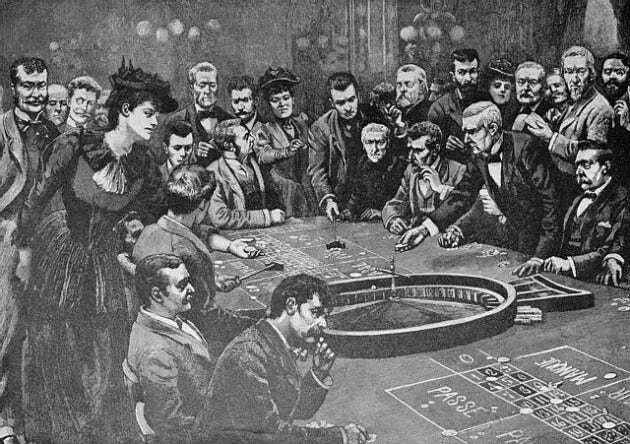Gambling, in its various forms, has been a part of human civilization for thousands of years. From ancient civilizations to modern societies, the practice of placing bets and risking money or valuables on uncertain outcomes has played a significant role in shaping cultures, economies, and social dynamics. In this comprehensive exploration, we delve into the rich history and evolution of gambling, tracing its origins from antiquity to the present day.
Ancient Origins:
The roots of gambling can be traced back to ancient civilizations, where games of chance were prevalent among early societies. In ancient China, for example, the practice of casting lots was used to determine outcomes in various matters, including divination, governance, and military decisions. Similarly, ancient civilizations in Mesopotamia, Egypt, and Greece also engaged in various forms of gambling, such as dice games, board games, and betting on sports competitions.
Medieval Europe and the Renaissance:

During the Middle Ages, gambling continued to flourish in Europe, albeit with varying degrees of acceptance by religious and political authorities. Games like dice, cards, and betting on animal fights were popular pastimes among both the nobility and commoners. However, gambling was often condemned by religious leaders as immoral and sinful, leading to periodic crackdowns and prohibitions.
The Renaissance period saw a resurgence of interest in gambling, particularly among the upper classes. Royal courts and aristocratic circles hosted lavish gambling events, where fortunes were won and lost on games of chance. The rise of gambling houses and casinos in cities like Venice, Paris, and London further fueled the popularity of gambling as a social activity and a source of entertainment.
Colonial America and the Wild West:
Gambling played a central role in the early history of the United States, from the colonial era to the Wild West. Colonial settlers brought gambling traditions from Europe, and games like cards, dice, and lotteries quickly became widespread. However, gambling was often viewed with suspicion by colonial authorities, who attempted to regulate or prohibit it through various laws and ordinances.
In the 19th century, the expansion of the American frontier brought gambling to the forefront of society, particularly in frontier towns and mining camps. Saloons and gambling halls sprung up across the West, offering games like poker, faro, and roulette to eager patrons. Gambling became synonymous with the frontier ethos of risk-taking, adventure, and quick wealth, but it also led to social problems and conflicts.
Modern Times:
In the 20th century, gambling underwent significant transformations, driven by technological advancements, changing social attitudes, and evolving regulatory frameworks. The legalization of gambling in various forms, including casinos, lotteries, and sports betting, led to a proliferation of gambling establishments around the world. Las Vegas emerged as the epicenter of the gambling industry, attracting millions of visitors annually with its opulent resorts, entertainment venues, and gaming options.

The advent of the internet in the late 20th century revolutionized the gambling industry, giving rise to online casinos, poker rooms, and sportsbooks. Players could now place bets and wager money from the comfort of their homes, using computers or mobile devices. The convenience and accessibility of online gambling have contributed to its widespread popularity and the exponential growth of the industry.
Today, gambling is a global phenomenon that spans continents, cultures, and socioeconomic backgrounds. It generates billions of dollars in revenue each year and employs millions of people worldwide. While gambling continues to face criticism and regulation in some jurisdictions, its allure remains undeniable for millions of enthusiasts who seek excitement, entertainment, and the chance to win big.
The history and evolution of gambling reflect humanity’s enduring fascination with chance, risk, and reward. From ancient rituals to modern casinos, gambling has evolved into a diverse and multifaceted industry that permeates every aspect of society. While its impact can be both positive and negative, gambling remains an integral part of human culture, offering thrills, challenges, and opportunities for fortune-seekers around the world. As we continue into the future, the story of gambling will undoubtedly continue to unfold, shaped by technological innovation, regulatory changes, and shifting social norms.

